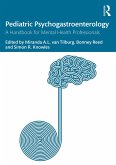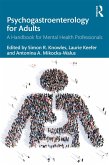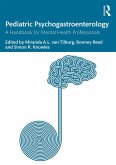Psychogastroenterology for Adults (eBook, ePUB)
A Handbook for Mental Health Professionals
Redaktion: Knowles, Simon R.; Mikocka-Walus, Antonina A.; Keefer, Laurie
41,95 €
41,95 €
inkl. MwSt.
Sofort per Download lieferbar

21 °P sammeln
41,95 €
Als Download kaufen

41,95 €
inkl. MwSt.
Sofort per Download lieferbar

21 °P sammeln
Jetzt verschenken
Alle Infos zum eBook verschenken
41,95 €
inkl. MwSt.
Sofort per Download lieferbar
Alle Infos zum eBook verschenken

21 °P sammeln
Psychogastroenterology for Adults (eBook, ePUB)
A Handbook for Mental Health Professionals
Redaktion: Knowles, Simon R.; Mikocka-Walus, Antonina A.; Keefer, Laurie
- Format: ePub
- Merkliste
- Auf die Merkliste
- Bewerten Bewerten
- Teilen
- Produkt teilen
- Produkterinnerung
- Produkterinnerung

Bitte loggen Sie sich zunächst in Ihr Kundenkonto ein oder registrieren Sie sich bei
bücher.de, um das eBook-Abo tolino select nutzen zu können.
Hier können Sie sich einloggen
Hier können Sie sich einloggen
Sie sind bereits eingeloggt. Klicken Sie auf 2. tolino select Abo, um fortzufahren.

Bitte loggen Sie sich zunächst in Ihr Kundenkonto ein oder registrieren Sie sich bei bücher.de, um das eBook-Abo tolino select nutzen zu können.
Timely and accessibly written, this book provides a unique, comprehensive introduction to psychogastroenterology, offering a step-by-step guide to evidence-based psychological treatment protocols.
- Geräte: eReader
- ohne Kopierschutz
- eBook Hilfe
- Größe: 9.22MB
Andere Kunden interessierten sich auch für
![Pediatric Psychogastroenterology (eBook, ePUB) Pediatric Psychogastroenterology (eBook, ePUB)]() Pediatric Psychogastroenterology (eBook, ePUB)37,95 €
Pediatric Psychogastroenterology (eBook, ePUB)37,95 €![CBT for Patients with Inflammatory Bowel Disease (eBook, ePUB) CBT for Patients with Inflammatory Bowel Disease (eBook, ePUB)]() Melissa G. HuntCBT for Patients with Inflammatory Bowel Disease (eBook, ePUB)28,95 €
Melissa G. HuntCBT for Patients with Inflammatory Bowel Disease (eBook, ePUB)28,95 €![Reclaim Your Life from IBS (eBook, ePUB) Reclaim Your Life from IBS (eBook, ePUB)]() Melissa G. HuntReclaim Your Life from IBS (eBook, ePUB)23,95 €
Melissa G. HuntReclaim Your Life from IBS (eBook, ePUB)23,95 €![Psychogastroenterology for Adults (eBook, PDF) Psychogastroenterology for Adults (eBook, PDF)]() Psychogastroenterology for Adults (eBook, PDF)41,95 €
Psychogastroenterology for Adults (eBook, PDF)41,95 €![Cognitive-Behavioral Therapy for Rumination Syndrome (CBT-RS) (eBook, ePUB) Cognitive-Behavioral Therapy for Rumination Syndrome (CBT-RS) (eBook, ePUB)]() Helen Burton MurrayCognitive-Behavioral Therapy for Rumination Syndrome (CBT-RS) (eBook, ePUB)24,95 €
Helen Burton MurrayCognitive-Behavioral Therapy for Rumination Syndrome (CBT-RS) (eBook, ePUB)24,95 €![Pediatric Psychogastroenterology (eBook, PDF) Pediatric Psychogastroenterology (eBook, PDF)]() Pediatric Psychogastroenterology (eBook, PDF)37,95 €
Pediatric Psychogastroenterology (eBook, PDF)37,95 €![Coping with Crohn's and Colitis (eBook, ePUB) Coping with Crohn's and Colitis (eBook, ePUB)]() Melissa G. HuntCoping with Crohn's and Colitis (eBook, ePUB)23,95 €
Melissa G. HuntCoping with Crohn's and Colitis (eBook, ePUB)23,95 €-
-
-
Timely and accessibly written, this book provides a unique, comprehensive introduction to psychogastroenterology, offering a step-by-step guide to evidence-based psychological treatment protocols.
Dieser Download kann aus rechtlichen Gründen nur mit Rechnungsadresse in A, B, BG, CY, CZ, D, DK, EW, E, FIN, F, GR, HR, H, IRL, I, LT, L, LR, M, NL, PL, P, R, S, SLO, SK ausgeliefert werden.
Produktdetails
- Produktdetails
- Verlag: Taylor & Francis eBooks
- Seitenzahl: 372
- Erscheinungstermin: 16. September 2019
- Englisch
- ISBN-13: 9781000672770
- Artikelnr.: 57931958
- Verlag: Taylor & Francis eBooks
- Seitenzahl: 372
- Erscheinungstermin: 16. September 2019
- Englisch
- ISBN-13: 9781000672770
- Artikelnr.: 57931958
- Herstellerkennzeichnung Die Herstellerinformationen sind derzeit nicht verfügbar.
Dr Simon R. Knowles is a Senior Lecturer and Clinical Psychologist based at Swinburne University of Technology, Melbourne. His clinical and research interests relate to the biological and psychological interactions of GI conditions and the brain-gut axis. Dr Knowles has published over 90 articles/book chapters and developed several free online psychological resilience programs for GI conditions. Dr Laurie Keefer is a GI Psychologist and Associate Professor of Medicine at the Icahn School of Medicine in NYC. She studies resilience, self-efficacy and optimism in the management of complex GI conditions. She has published over 100 papers and serves on the Board of Directors for the Rome Foundation. Dr Antonina A. Mikocka-Walus is a GI Psychologist and Associate Professor in Health Psychology at Deakin University, Melbourne. She has published over 100 research papers/book chapters. Her interdisciplinary research has contributed to the recent guidelines on the management of inflammatory bowel disease in Australia, North America and Europe.
Foreword by William E. Whitehead; Part 1: Introduction to gastrointestinal
physiology and conditions, the brain-gut axis, and working within health
care teams; Chapter 1: The gastrointestinal tract: A brief introduction to
healthy digestion by Dr Christopher F.D Li Wan Suen and Dr Peter De Cruz;
Chapter 2: The upper gastrointestinal tract, common conditions and
recommended treatments by Professor Geoff Hebbard; Chapter 3: The lower
gastrointestinal tract, common conditions and recommended treatments by Dr
Rebecca Burgell and Dr Bei Ye; Chapter 4: Gastroenterological cancers and
stomas by Professor Timothy Pearman and Dr Elizabeth L. Addington; Chapter
5: Stress and the brain-gut axis across the spectrum of digestive disorders
by Dr Gregory Sayuk; Chapter 6: Working with gastroenterologists, health
administrators, and other members of the gastrointestinal and allied health
care team by Dr Sarah W. Kinsinger; Part Two: Psychological concerns and
conditions in gastroenterological cohorts; Chapter 7: Common
gastrointestinal investigations and psychological concerns by Dr Tuan Duong
and Professor Jane M. Andrews; Chapter 8: Common psychological issues in
gastrointestinal conditions by Associate Professor Antonina Mikocka-Walus,
Ms Catherine Emerson, Dr Lisa Olive and Dr Simon R. Knowles; Chapter 9:
Working with complex patients with gastrointestinal and psychological
concerns Dr Emily Edlynn and Dr Tiffany Taft; Part Three: Psychological,
psychopharmacological, and eHealth approaches in psychogastroenterology;
Chapter 10: Psychological assessment, formulation, and intervention
planning in gastrointestinal cohorts with psychological issues by Dr Philip
Keightley and Dr Simon R. Knowles; Chapter 11: Promoting change in
psychological and gastrointestinal conditions - motivational interviewing
(MI) by Dr Daron A. Watts, Dr Hans R Watson and Professor Terry L. Correll;
Chapter 12: Promoting change in gastrointestinal conditions -
Solution-Focused Brief Therapy (SFBT) by Assistant Professor Anne Lutz and
Dr Christiaan van Woerden; Chapter 13: Stress management and
mindfulness-based stress reduction (MBSR) approaches to gastrointestinal
conditions by Anjali U Pandit and Dr Sarah Ballou; Chapter 14: Cognitive
behavioural therapy (CBT) approaches to gastrointestinal conditions by Ms
Karen J. Conlon and Associate Professor Laurie Keefer; Chapter 15: Hypnosis
approaches to gastrointestinal conditions by Dr Megan E. Riehl; Chapter 16:
Psychodynamic-interpersonal therapy (PIT) approaches to gastrointestinal
conditions by Professor Elspeth Guthrie; Chapter 17: Emerging approaches -
acceptance and commitment therapy (ACT) approaches to gastrointestinal
conditions by Associate Professor Nuno Ferreira; Chapter 18: Behavioural
approaches to managing substance-related problems in gastrointestinal
conditions by Professor Eva Szigethy and Dr Trent Emerick; Chapter 19:
Psychopharmacology in gastrointestinal cohorts by Ms Elspeth Carruthers and
Dr Juilan Stern; Chapter 20: The role of eHealth in psychogastroenterology
by Dr Andrew McCombie and Dr Simon R. Knowles; Part 4: Supervision and
future challenges in psychogastroenterology; Chapter 21: Supervision and
future challenges in psychogastroenterology by Dr Simon R Knowles,
Associate Professor Laurie Keefer and Associate Professor Antonina
Mikocka-Walus; References; Index
physiology and conditions, the brain-gut axis, and working within health
care teams; Chapter 1: The gastrointestinal tract: A brief introduction to
healthy digestion by Dr Christopher F.D Li Wan Suen and Dr Peter De Cruz;
Chapter 2: The upper gastrointestinal tract, common conditions and
recommended treatments by Professor Geoff Hebbard; Chapter 3: The lower
gastrointestinal tract, common conditions and recommended treatments by Dr
Rebecca Burgell and Dr Bei Ye; Chapter 4: Gastroenterological cancers and
stomas by Professor Timothy Pearman and Dr Elizabeth L. Addington; Chapter
5: Stress and the brain-gut axis across the spectrum of digestive disorders
by Dr Gregory Sayuk; Chapter 6: Working with gastroenterologists, health
administrators, and other members of the gastrointestinal and allied health
care team by Dr Sarah W. Kinsinger; Part Two: Psychological concerns and
conditions in gastroenterological cohorts; Chapter 7: Common
gastrointestinal investigations and psychological concerns by Dr Tuan Duong
and Professor Jane M. Andrews; Chapter 8: Common psychological issues in
gastrointestinal conditions by Associate Professor Antonina Mikocka-Walus,
Ms Catherine Emerson, Dr Lisa Olive and Dr Simon R. Knowles; Chapter 9:
Working with complex patients with gastrointestinal and psychological
concerns Dr Emily Edlynn and Dr Tiffany Taft; Part Three: Psychological,
psychopharmacological, and eHealth approaches in psychogastroenterology;
Chapter 10: Psychological assessment, formulation, and intervention
planning in gastrointestinal cohorts with psychological issues by Dr Philip
Keightley and Dr Simon R. Knowles; Chapter 11: Promoting change in
psychological and gastrointestinal conditions - motivational interviewing
(MI) by Dr Daron A. Watts, Dr Hans R Watson and Professor Terry L. Correll;
Chapter 12: Promoting change in gastrointestinal conditions -
Solution-Focused Brief Therapy (SFBT) by Assistant Professor Anne Lutz and
Dr Christiaan van Woerden; Chapter 13: Stress management and
mindfulness-based stress reduction (MBSR) approaches to gastrointestinal
conditions by Anjali U Pandit and Dr Sarah Ballou; Chapter 14: Cognitive
behavioural therapy (CBT) approaches to gastrointestinal conditions by Ms
Karen J. Conlon and Associate Professor Laurie Keefer; Chapter 15: Hypnosis
approaches to gastrointestinal conditions by Dr Megan E. Riehl; Chapter 16:
Psychodynamic-interpersonal therapy (PIT) approaches to gastrointestinal
conditions by Professor Elspeth Guthrie; Chapter 17: Emerging approaches -
acceptance and commitment therapy (ACT) approaches to gastrointestinal
conditions by Associate Professor Nuno Ferreira; Chapter 18: Behavioural
approaches to managing substance-related problems in gastrointestinal
conditions by Professor Eva Szigethy and Dr Trent Emerick; Chapter 19:
Psychopharmacology in gastrointestinal cohorts by Ms Elspeth Carruthers and
Dr Juilan Stern; Chapter 20: The role of eHealth in psychogastroenterology
by Dr Andrew McCombie and Dr Simon R. Knowles; Part 4: Supervision and
future challenges in psychogastroenterology; Chapter 21: Supervision and
future challenges in psychogastroenterology by Dr Simon R Knowles,
Associate Professor Laurie Keefer and Associate Professor Antonina
Mikocka-Walus; References; Index
Foreword by William E. Whitehead; Part 1: Introduction to gastrointestinal
physiology and conditions, the brain-gut axis, and working within health
care teams; Chapter 1: The gastrointestinal tract: A brief introduction to
healthy digestion by Dr Christopher F.D Li Wan Suen and Dr Peter De Cruz;
Chapter 2: The upper gastrointestinal tract, common conditions and
recommended treatments by Professor Geoff Hebbard; Chapter 3: The lower
gastrointestinal tract, common conditions and recommended treatments by Dr
Rebecca Burgell and Dr Bei Ye; Chapter 4: Gastroenterological cancers and
stomas by Professor Timothy Pearman and Dr Elizabeth L. Addington; Chapter
5: Stress and the brain-gut axis across the spectrum of digestive disorders
by Dr Gregory Sayuk; Chapter 6: Working with gastroenterologists, health
administrators, and other members of the gastrointestinal and allied health
care team by Dr Sarah W. Kinsinger; Part Two: Psychological concerns and
conditions in gastroenterological cohorts; Chapter 7: Common
gastrointestinal investigations and psychological concerns by Dr Tuan Duong
and Professor Jane M. Andrews; Chapter 8: Common psychological issues in
gastrointestinal conditions by Associate Professor Antonina Mikocka-Walus,
Ms Catherine Emerson, Dr Lisa Olive and Dr Simon R. Knowles; Chapter 9:
Working with complex patients with gastrointestinal and psychological
concerns Dr Emily Edlynn and Dr Tiffany Taft; Part Three: Psychological,
psychopharmacological, and eHealth approaches in psychogastroenterology;
Chapter 10: Psychological assessment, formulation, and intervention
planning in gastrointestinal cohorts with psychological issues by Dr Philip
Keightley and Dr Simon R. Knowles; Chapter 11: Promoting change in
psychological and gastrointestinal conditions - motivational interviewing
(MI) by Dr Daron A. Watts, Dr Hans R Watson and Professor Terry L. Correll;
Chapter 12: Promoting change in gastrointestinal conditions -
Solution-Focused Brief Therapy (SFBT) by Assistant Professor Anne Lutz and
Dr Christiaan van Woerden; Chapter 13: Stress management and
mindfulness-based stress reduction (MBSR) approaches to gastrointestinal
conditions by Anjali U Pandit and Dr Sarah Ballou; Chapter 14: Cognitive
behavioural therapy (CBT) approaches to gastrointestinal conditions by Ms
Karen J. Conlon and Associate Professor Laurie Keefer; Chapter 15: Hypnosis
approaches to gastrointestinal conditions by Dr Megan E. Riehl; Chapter 16:
Psychodynamic-interpersonal therapy (PIT) approaches to gastrointestinal
conditions by Professor Elspeth Guthrie; Chapter 17: Emerging approaches -
acceptance and commitment therapy (ACT) approaches to gastrointestinal
conditions by Associate Professor Nuno Ferreira; Chapter 18: Behavioural
approaches to managing substance-related problems in gastrointestinal
conditions by Professor Eva Szigethy and Dr Trent Emerick; Chapter 19:
Psychopharmacology in gastrointestinal cohorts by Ms Elspeth Carruthers and
Dr Juilan Stern; Chapter 20: The role of eHealth in psychogastroenterology
by Dr Andrew McCombie and Dr Simon R. Knowles; Part 4: Supervision and
future challenges in psychogastroenterology; Chapter 21: Supervision and
future challenges in psychogastroenterology by Dr Simon R Knowles,
Associate Professor Laurie Keefer and Associate Professor Antonina
Mikocka-Walus; References; Index
physiology and conditions, the brain-gut axis, and working within health
care teams; Chapter 1: The gastrointestinal tract: A brief introduction to
healthy digestion by Dr Christopher F.D Li Wan Suen and Dr Peter De Cruz;
Chapter 2: The upper gastrointestinal tract, common conditions and
recommended treatments by Professor Geoff Hebbard; Chapter 3: The lower
gastrointestinal tract, common conditions and recommended treatments by Dr
Rebecca Burgell and Dr Bei Ye; Chapter 4: Gastroenterological cancers and
stomas by Professor Timothy Pearman and Dr Elizabeth L. Addington; Chapter
5: Stress and the brain-gut axis across the spectrum of digestive disorders
by Dr Gregory Sayuk; Chapter 6: Working with gastroenterologists, health
administrators, and other members of the gastrointestinal and allied health
care team by Dr Sarah W. Kinsinger; Part Two: Psychological concerns and
conditions in gastroenterological cohorts; Chapter 7: Common
gastrointestinal investigations and psychological concerns by Dr Tuan Duong
and Professor Jane M. Andrews; Chapter 8: Common psychological issues in
gastrointestinal conditions by Associate Professor Antonina Mikocka-Walus,
Ms Catherine Emerson, Dr Lisa Olive and Dr Simon R. Knowles; Chapter 9:
Working with complex patients with gastrointestinal and psychological
concerns Dr Emily Edlynn and Dr Tiffany Taft; Part Three: Psychological,
psychopharmacological, and eHealth approaches in psychogastroenterology;
Chapter 10: Psychological assessment, formulation, and intervention
planning in gastrointestinal cohorts with psychological issues by Dr Philip
Keightley and Dr Simon R. Knowles; Chapter 11: Promoting change in
psychological and gastrointestinal conditions - motivational interviewing
(MI) by Dr Daron A. Watts, Dr Hans R Watson and Professor Terry L. Correll;
Chapter 12: Promoting change in gastrointestinal conditions -
Solution-Focused Brief Therapy (SFBT) by Assistant Professor Anne Lutz and
Dr Christiaan van Woerden; Chapter 13: Stress management and
mindfulness-based stress reduction (MBSR) approaches to gastrointestinal
conditions by Anjali U Pandit and Dr Sarah Ballou; Chapter 14: Cognitive
behavioural therapy (CBT) approaches to gastrointestinal conditions by Ms
Karen J. Conlon and Associate Professor Laurie Keefer; Chapter 15: Hypnosis
approaches to gastrointestinal conditions by Dr Megan E. Riehl; Chapter 16:
Psychodynamic-interpersonal therapy (PIT) approaches to gastrointestinal
conditions by Professor Elspeth Guthrie; Chapter 17: Emerging approaches -
acceptance and commitment therapy (ACT) approaches to gastrointestinal
conditions by Associate Professor Nuno Ferreira; Chapter 18: Behavioural
approaches to managing substance-related problems in gastrointestinal
conditions by Professor Eva Szigethy and Dr Trent Emerick; Chapter 19:
Psychopharmacology in gastrointestinal cohorts by Ms Elspeth Carruthers and
Dr Juilan Stern; Chapter 20: The role of eHealth in psychogastroenterology
by Dr Andrew McCombie and Dr Simon R. Knowles; Part 4: Supervision and
future challenges in psychogastroenterology; Chapter 21: Supervision and
future challenges in psychogastroenterology by Dr Simon R Knowles,
Associate Professor Laurie Keefer and Associate Professor Antonina
Mikocka-Walus; References; Index







